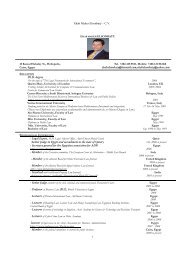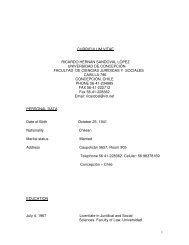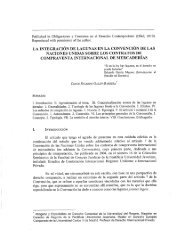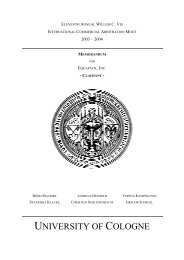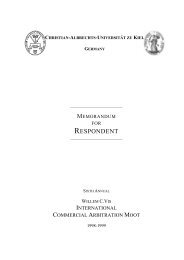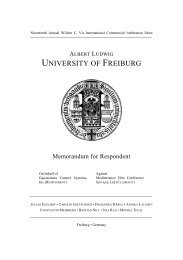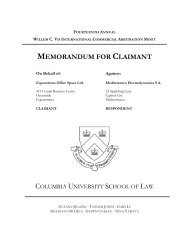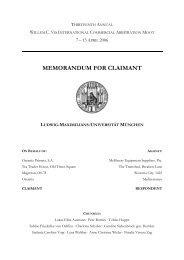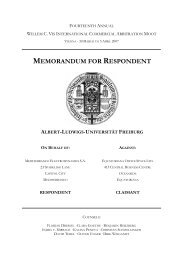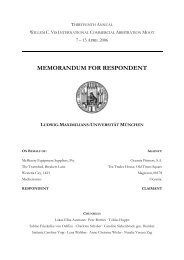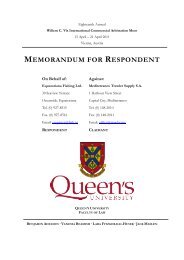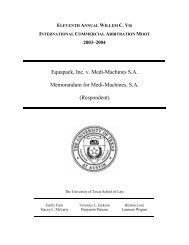memorandum for claimant - CISG Database
memorandum for claimant - CISG Database
memorandum for claimant - CISG Database
Create successful ePaper yourself
Turn your PDF publications into a flip-book with our unique Google optimized e-Paper software.
- 27 - SUPERB<br />
B. The Contractually Agreed Prerequisites <strong>for</strong> Joining RELIABLE to the Arbitration Conducted Between<br />
SUPERB and Respondent Are Not Met<br />
Even if this Tribunal should find that an agreement to join RELIABLE to the arbitral proceedings conducted<br />
between SUPERB and Respondent can be derived from the contract concluded between SUPERB and Respondent<br />
as well as from the one concluded between Respondent and RELIABLE, nevertheless the contractually agreed<br />
prerequisites <strong>for</strong> joining RELIABLE are not met in the case at hand. The prerequisites stated within the contract<br />
between SUPERB and Respondent <strong>for</strong> joining RELIABLE to the arbitration are not met, since new questions of law<br />
would arise through the joinder of RELIABLE. In clause No. 24 of the contract dated 10 June 1996 SUPERB and<br />
Respondent agreed to a possible settlement of the “claim by Seller against the supplier[]” provided that “the<br />
claims of Seller against the supplier raise no new question of law or fact from those to be decided in the<br />
arbitration between Buyer and Seller”. 162<br />
New questions of law will arise. First, the law applicable to the contract between Respondent and RELIABLE are<br />
the UNIDROIT Principles. Parties can agree on the UNIDROIT Principles as the proper law governing a<br />
contract. 163 Respondent and RELIABLE agreed that their “contract shall incorporate and be governed by the<br />
UNIDROIT Principles of International Contract Law”. 164 In contrast to this, the contract between SUPERB and<br />
Respondent refers to the <strong>CISG</strong>. According to Art. 28 (1) AAA-Rules the tribunal shall apply the substantive law<br />
designated by the parties as applicable to the dispute. There<strong>for</strong>e, the question is raised which kind of law is<br />
applicable to the interpretation of conduct or fact in Respondent’s claim against RELIABLE. Generally, the <strong>CISG</strong><br />
would be applicable to the contract, because Hanseatica and Equatoriana are parties to the <strong>CISG</strong>. However, in the<br />
case at hand the incorporation of the UNIDROIT Principles in the contract between Respondent and RELIABLE 165<br />
can be interpreted as if the Principles themselves constitute the proper law of the contract and discard the<br />
<strong>CISG</strong>. 166<br />
Second, even if this Tribunal should find that the UNIDROIT Principles cannot constitute the proper law of the<br />
contract between Respondent and RELIABLE, however, the application of the UNIDROIT Principles as a<br />
162<br />
Claimant’s Ex. No. 1.<br />
163<br />
Klaus Peter Berger, International Arbitral Practice and the UNIDROIT Principles of International Commercial Contracts, in The<br />
American Journal of Comparative Law, Vol. XLVI, No. 1 129, 133 (1998) [hereinafter Berger/Arbitral Practice].<br />
164<br />
Respondent’s Ex. No. 1, clause 12.<br />
165<br />
Respondent’s Ex. No. 1.<br />
166<br />
See Hans van Houtte, The UNIDROIT Principles of International Commercial Contracts, in Arbitration International, Volume 11,<br />
No. 4 381 (1995) [hereinafter van Houtte/UNIDROIT Principles]; Berger/Arbitral Practice, supra note 163, at 133.



